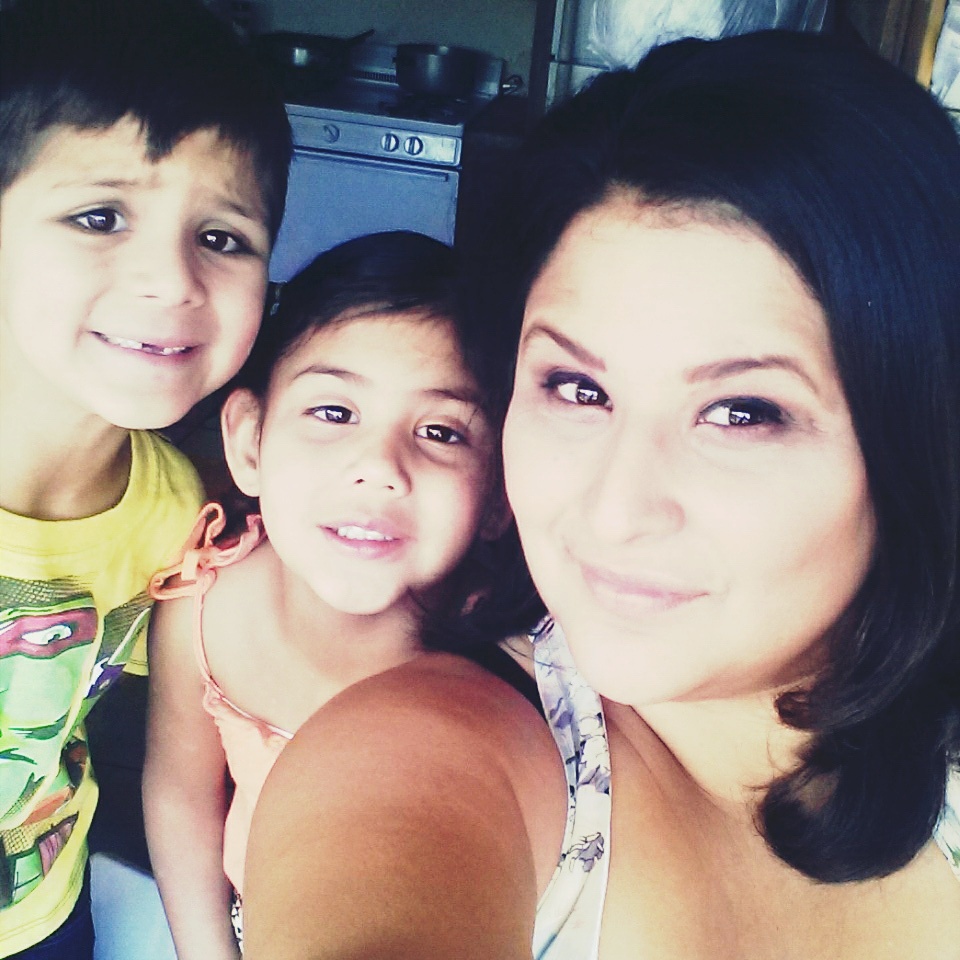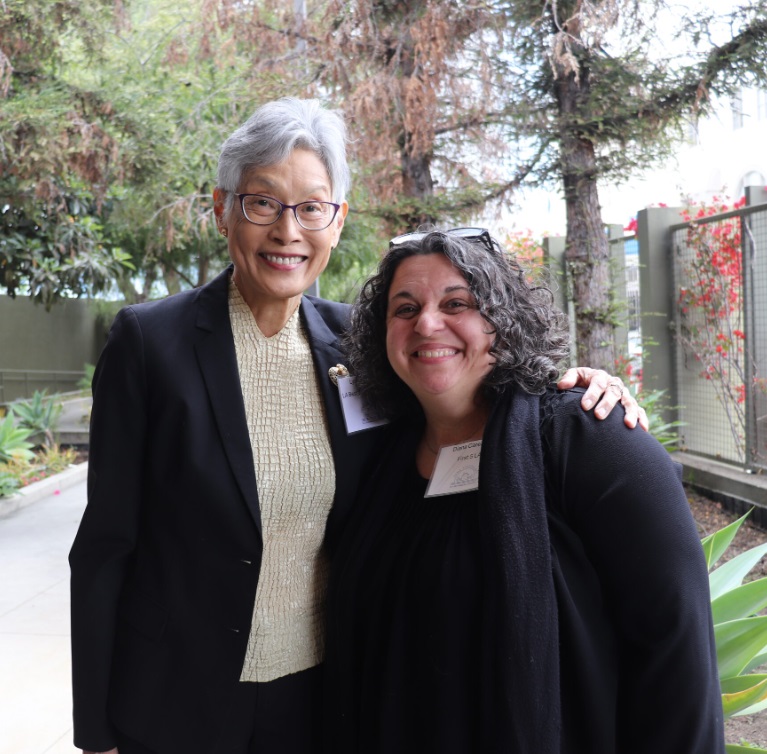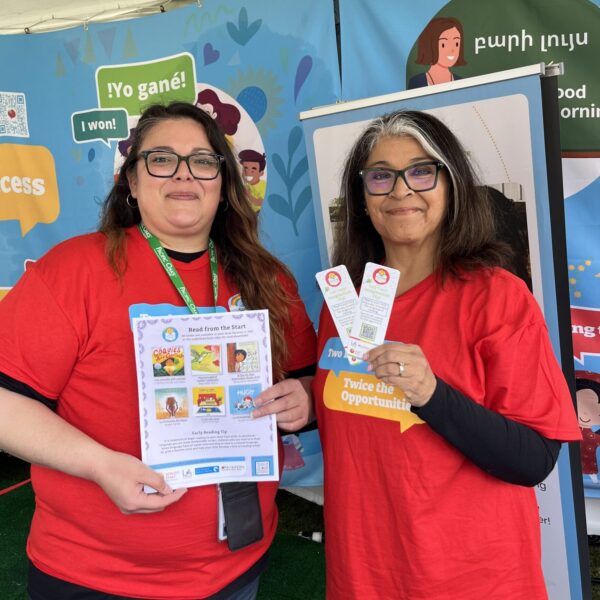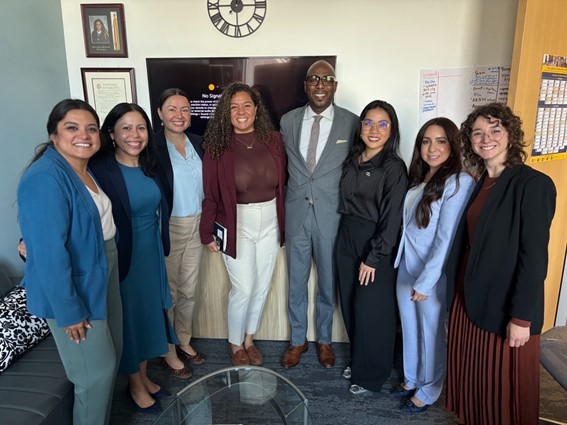Desiree Puentes could only pray for help.
The young mother was struggling to raise four children in Monterey Park in 2013 while caring for her bed-ridden great grandmother. She had also suffered from domestic violence at the hands of her husband and was currently enduring emotional abuse from him.
“I couldn’t pay attention to my kids the way I should have,” Puentes recalled.
So she prayed. But when help came, it was not in the form she wanted.
“Seeing my kids go through the same thing I went through, it was unbearable” -Desiree Puentes
The Department of Children and Family Services arrived in July 2013 to assess the safety of her children. The allegation: general neglect.
Puentes’ mind flashed back to her own childhood when, at age 6, her drug-addicted mother lost custody of Puentes and her four siblings. She and her brother went to live with her great- grandmother.
“It was traumatic because even though my great-grandparents went over and beyond what my mother and father could provide,” Puentes recalled, “I still wanted my parents.”
So Puentes went to work to reclaim her children, spending nearly a year taking anger management, spiritual and domestic violence classes. “I went over and beyond to better myself and get my children back. I had to fix me before I could get my children.”
But when she was reunited with her family the following year, Puentes’ children had changed.
One of the foster care mothers, Puentes alleges, harshly disciplined three of her four children who were living at the home: 2-year-old daughter Jenesis, 4-year-old son Aiden and 10-year-old son Azrael.*
Some of the other children in the foster home were equally harsh, according to Puentes, telling Aiden and Jenesis that “your mom is not going to get you back.”
“Seeing my kids go through the same thing I went through, it was unbearable,” Puentes recalled. “I think it had an extreme impact on them.”
Indeed, Jenesis and Aiden’s traumatic triad of growing up in a home with domestic violence, being taken from their mother, and placed in a fear-inducing foster home are each what experts call Adverse Childhood Experiences (ACEs), which can lead to a myriad of negative emotional, social and physical health consequences in a child’s youth and well into adulthood. ACEs can include economic hardship, maltreatment, neglect, physical and emotional abuse, witnessing domestic violence, living with someone with an alcohol or drug problem, a parent serving time in jail, and family disorder leading to separation or divorce.
When Aiden and Jenesis were reunited with their mother, Puentes’ recalled, they were very different from before they were removed from their home and placed in foster care. Jenesis, then age 3, had temper tantrums, defiance, clinging and attention-seeking behaviors. Aiden, then age 5, had inattentiveness, defiance, physical aggression and temper tantrums.
As a result, the children ran the house. Puentes said she felt “like a push over” and the kids “got away with everything” because they knew she wouldn’t follow through with empty threats. “I didn’t want children’s services to be called on me again so I was kind of afraid to discipline my children.”

After months in therapy, Puentes was referred to Parent Child Interactive Therapy (PCIT) in March 2015 at Five Acres, a Pasadena-area nonprofit agency providing services to families throughout Southern California. Five Acres is one of 51 agencies employing PCIT throughout Los Angeles County in part due to First 5 LA’s $20 million, five-year investment in PCIT training for up to 400 therapists. So far, therapists have served 3,855 clients throughout the course of their training since the First 5 LA program began.
Through PCIT, a therapist wearing headphones in an observation room on the other side of a one-way mirror guides a parent’s interaction with their child in another room. The parent learns to use labeled praise, behavioral descriptions, reflections and selective attention to manage their child’s disruptive behaviors. Targeted at families with children ages 2 to 7 at risk of entering the child welfare system, PCIT provides up to two dozen of these 50-minute sessions per family.
“One of the things that happens with kids that have ACES is that they experience a lack of emotional security that usually their parents provide, and for one reason or another with abuse or neglect, the parents have not been that supportive presence. This causes kids to have anxiety and a lot of times this leads to bad behaviors,” said Susan G. Timmer of the UC Davis PCIT Training Center. “One of the things that PCIT does is that it gives parents a lot more understanding about what drives their kid’s behavior. It helps parents to be supportive, which calms kids down, reducing their anxiety and causing them to feel protected.”
Puentes participated in PCIT with Aiden for seven months and 10 months with Jenesis. During that time, she practiced her positive parenting skills on a daily basis with her children at home, school and in the community.
“For most parents, it’s telling your children ‘No, no, no, no, no,’” Puentes, now 32, explained. “I like this program because it focuses more on the positive. Even if it’s just Jenesis spoon feeding her baby (doll), she gets a kick out of it when I say, ‘It’s good that you’re feeding your baby.’ Because I’m validating what she is doing. I’m highlighting the positive. They have an easier time listening to me because they feel like I am paying attention to them. ”
This has helped with discipline, as well. When they start climbing over the furniture in the living room, she simply says, “Butts on the couch!” She also employs time-outs for hitting and other rambunctious behavior, even in public. And they listen when mom starts to count to 10. “Once I get to five, they know it’s an automatic time-out. It works with all of them. From my 4-year-old to my 13-year-old.”
The Los Angeles Times and the Chronicle of Social Change have penned articles about PCIT’s implementation and impact in Los Angeles County through First 5 LA funding. The video below is another such story.
“PCIT is an evidence-based prevention program that can combat ACEs,” said First 5 LA Program Officer Bill Gould. “It has been shown to successfully reduce trauma symptoms in children including for particularly vulnerable kids who have been abused or maltreated. It has also been documented as an effective practice for reducing incidences of low to moderately severe physical abuse cases involving young children.”
Added Gould: “Through First 5 LA’s PCIT workforce development program, we have not only invested in training therapists in PCIT at participating agencies, but potentially helped many of these agencies to build an infrastructure where they can train future therapists. This can be carried forward for years to come, long after our investment.”
A chorus of experts and research have touted the impact of PCIT, like Richard Cohen, Director of Project ABC at Children’s Institute, Inc., who said: “PCIT can give caregivers immediate help in managing the challenging behaviors children exhibit as the result of the trauma-inducing experiences that brought them to – and that result from – child welfare.”
In a January 2016 report from Compton-based Star View Community Services, of the 63 participants served through the agency’s First 5 LA-funded PCIT training program during the past year, more than two out of three children “improved in a reliable and clinically significant manner by the time they exited the program.” This improvement extended outside the home as well: the number of children experiencing significant problems in school dropped from 42 percent to 17 percent.
“Without PCIT, it is likely that young children would not receive some form of mental health intervention until later age” – Wendy Gutierrez
In its 2016 California Children’s Report Card, Children Now cited PCIT as among the programs that help families with children with a history of maltreatment.
“Without PCIT, it is likely that young children would not receive some form of mental health intervention until later age, increasing the probability that they would develop more ACEs and thereby increasing the likelihood for health and social problems in later life,” echoed Wendy Gutierrez, the Five Acres therapist who worked with Puentes.
The Lifelong Impact of Childhood Trauma
Multiple ACEs during childhood can have a lifelong negative impact on academic performance, social connections, mental and physical health. It can also increase violent behaviors, leading to a greater risk of incarceration. One reason: trauma can affect brain development in young children. For example, adults who were maltreated as children show a reduced volume of the hippocampus, which plays a central role in learning. Early experiences of trauma can also interfere with the subcortical and limbic systems, which can result in extreme anxiety, depression and difficulty forming attachments to other people.
 In the landmark 1985 ACE Study of 17,000 San Diego Kaiser patients by Kaiser Permanente and the Centers for Disease Control and Prevention, researchers found that two out of three people had experienced at least one ACE. In most cases, not just one, but several, of these ACEs existed in the child’s home.
In the landmark 1985 ACE Study of 17,000 San Diego Kaiser patients by Kaiser Permanente and the Centers for Disease Control and Prevention, researchers found that two out of three people had experienced at least one ACE. In most cases, not just one, but several, of these ACEs existed in the child’s home.
The more ACEs a child endures, the worse the potential long-term outcome. Studies have shown that kids with three or more ACEs were:
- Three times more likely to fail academically
- Five times more likely to be chronically absent
- Six times more likely to have behavioral problems like disruptive or violent outbursts
Kids with four or more ACEs were:
- Almost two and a half times more likely to suffer from heart disease
- More than four times as likely to be diagnosed with Alzheimer’s disease or dementia
- More than five times as likely to suffer from depression
And it gets worse:
- Compared to a person with no ACEs, a person with four or more ACEs was twice as likely to smoke, seven times more likely to be an alcoholic and 12 times more likely to have attempted suicide
Trauma-inducing events like ACEs have a lasting impact on the psyche. In cases of domestic violence, it can take two to three years to get past the shock. The grief of losing a parent: seven years. Sexual abuse: 25-30 years.
“We want everyone to understand that one of the largest public health crises in America is hidden in plain sight “- Robert K. Ross
Furthermore, trauma can affect entire communities. In high violence neighborhoods, many experts believe that whole communities are traumatized, according to a February report on Adverse Community Experiences and Resilience by the Prevention Institute.
Nor are childhood traumatic incidents limited to any specific community. First 5 LA Research Analyst Pegah Faed, who leads First 5 LA’s Trauma-Informed Care team, said that “almost 45 percent of children in California have been exposed to at least one or more adverse childhood experience.”
According to the Data Resource Center for Child & Adolescent Health, one in five children in Los Angeles County have endured two or more ACEs. There may even be more than reported, as ACEs can go undetected because of the shame that hampers people from talking about such experiences.
“We want everyone to understand that one of the largest public health crises in America is hidden in plain sight: the lifetime of mental and physical health problems that have their roots in childhood adversity and trauma,” said California Endowment President & CEO Robert K. Ross.
Unfortunately, California is doing little to combat early childhood trauma. In the aforementioned 2016 California Children’s Report Card, Children Now recently gave a D- to the state for its inadequate response to childhood trauma.
Rays of Hope
Amidst the dark cloud of childhood trauma, however, rays of hope are breaking through in the Golden State.
 In addition to its praise of PCIT, Children Now cited First 5 LA’s voluntary home visiting program as one example of a service that is trauma-informed and that focuses on preventing trauma by providing support for parents of newborn children. Parents receive personal coaching on topics ranging from maternal depression and parent-child bonding to breastfeeding and home safety. This program acts to ease stress and frustration and to connect families to a range of supportive services in their community. Children whose parents participated in this type of program grow up healthier, are ready for school and are less likely to end up in social welfare or juvenile corrections systems.
In addition to its praise of PCIT, Children Now cited First 5 LA’s voluntary home visiting program as one example of a service that is trauma-informed and that focuses on preventing trauma by providing support for parents of newborn children. Parents receive personal coaching on topics ranging from maternal depression and parent-child bonding to breastfeeding and home safety. This program acts to ease stress and frustration and to connect families to a range of supportive services in their community. Children whose parents participated in this type of program grow up healthier, are ready for school and are less likely to end up in social welfare or juvenile corrections systems.
Another example is The California Endowment’s investment in teaching educators and school staff about how childhood trauma can manifest as behavioral problems. Rather than reacting by suspending children, schools are developing alternatives that keep children in school through supportive services that teach how to develop resilience and resolve conflicts peacefully.
In fact, building resilience in young children can be a key buffer to the negative impacts of ACEs. For instance, among children with two or more ACEs, those who show resilience are much more likely to be engaged in school and less likely to repeat a grade.
Another key to building resilience and preventing childhood trauma, experts agree, is the creation of trauma-informed institutions and communities that understand how unaddressed childhood trauma can set a child down a dangerous path.
What does a trauma-informed community look like for a young child?
“First 5 LA recognizes that to achieve the impact we seek in the county, we can’t do this alone.” – Pegah Faed
“It looks like a pediatrician who asks a new mom about depression and whether her own upbringing may be making it harder for her to connect with her baby,” said Esta Soler, President of Futures Without Violence, a San Francisco-based nonprofit pioneer in the prevention of violence against women and children. “It’s the Head Start teacher who sees a preschooler biting and losing his temper too quickly who knows how to help that child calm himself and doesn’t immediately try to suspend him. It’s the police officer who understands that even when he has to arrest a parent, he can do so in a way that helps the child understand what is happening, that she is safe, and that none of this is her fault even if she was the one who called the police.”
First 5 LA recognizes the importance of this trauma-informed approach while it continues to implement its five-year PCIT workforce development program.
“As part of our new strategic plan, we are shifting our approach for our health-related strategies to focus on systems change work,” Faed said. “We are very interested in this work and during our current exploratory phase, we are eager to learn with others about what a trauma-informed Los Angeles County could look like. First 5 LA recognizes that to achieve the impact we seek in the county, we can’t do this alone.”
The first step in that process will be First 5 LA’s co-convening on April 1, Healing From Trauma and Building Resilience in Los Angeles: How Systems Leaders Can Make a Difference, planned in partnership with The California Endowment, the California Community Foundation, and the Ralph M. Parsons Foundation.
This convening will bring together L.A. County agencies, foundations and other key stakeholders to learn about current trauma-informed care systems efforts, help identify points of alignment, and discuss future actions. The convening will be the launch of First 5 LA’s collective impact strategy to jointly develop a common agenda to transform Los Angeles into a trauma-informed county.
“Addressing the tremendous impact of trauma on individuals and the communities in which they live requires a collective effort,” said First 5 LA Executive Director Kim Belshé. “Working in partnership with public and private entities, we can help ensure that L.A. County residents, community organizations, and government institutions can understand, recognize and respond to the effects of all types of trauma. It’s essential that policymakers make this a priority countywide and statewide here in California.”
In describing the California Endowment’s interest in trauma-informed care, Ross said: “Young people of color led us to a greater understanding of the role of trauma in homes and neighborhoods in underserved communities, and lifted up the need for social-emotional health and healing that is a growing part of our work.”
Wendy Garen, President and CEO of the Ralph M. Parsons Foundation, expressed excitement for the April 1 convening: “I’m delighted to see increasing efforts in the foundation community, including working closely with government, in a collective impact model to move the needle for some of the most vulnerable people in our community.”
Moving the Needle
Meanwhile, back in Monterey Park, Puentes is moving the needle in a positive direction for her children a little more each day.
“When I got them back home, I told my kids I would never let them go back to foster care again” – Desiree Puentes
“When I got them back home, I told my kids I would never let them go back to foster care again,” Puentes recalled. Thanks in part to PCIT, that promise has come true. “I think my kids are less anxious because they feel that mom is more soothing. They know I say what I do and do what I say. There’s more consistency. So now everything is okay. I regained their trust.”
Even more, she is sharing what she learned with other parents. At a recent birthday party, a number of the parents noticed how focused and engaged the children were in response to Puentes, who was showering them with labeled praise.
“Where did you learn to talk like that?” one parent asked.
Puentes smiled and told them about her participation in PCIT, which she called “an exclusive club with its own lingo.” Then she offered them her therapist’s card. “It made me feel so proud.”
*(Five Acres filed a child abuse report about the alleged maltreatment of Puentes’ children at the foster home.
The Los Angeles County Department of Children and Family Services investigates all allegations of child abuse in foster homes and takes necessary action to ensure the safety of children. Results of investigations are confidential.)






